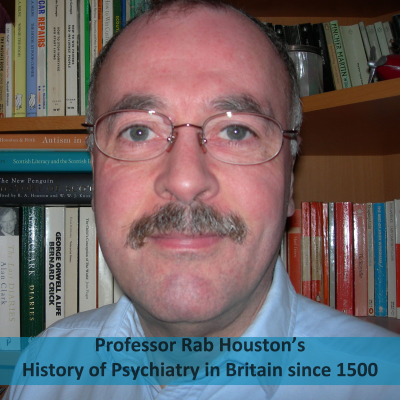
History of Psychiatry Podcast Series
Englisch
Gratis en Podimo
Kostenlos hören bei Podimo
Starte jetzt und verbinde dich mit deinen Lieblingspodcaster*innen
- Vertraut von über 1 Mio. deutschen Hörer*innen
- Über 1.000 lokale Podcasts und Shows – nur bei Podimo
- Keine Zahlung nötig
Mehr History of Psychiatry Podcast Series
Rab Houston was born in Hamilton, Scotland, lived in India and Ghana and was educated at the Edinburgh Academy and St Andrews University before spending six years at Cambridge University as a research student (Peterhouse) and research fellow (Clare College). He has worked at the University of St Andrews since 1983 and is Professor of Modern History, specialising in British social history. He is a fellow of both the Royal Historical Society and the Royal Society of Edinburgh (Scotland’s national academy), and a member of the Academia Europaea. He is married to a senior university manager and lives in Edinburgh. In his spare time he likes any form of active meditation. http://www.st-andrews.ac.uk/history/staff/rabhouston.html https://arts.st-andrews.ac.uk/psychhist/
Alle Folgen
121 FolgenThe 1966 Aberfan disaster
In this podcast, Professor Houston talks about the psychological impact on those affected by the Aberfan disaster of 1966. The podcast expands on an interview Prof Houston gave to BBC Wales as part of a series of podcasts recently produced about the disaster. It is strongly advised that you listen to podcast 7 of the BBC series prior to listening to this podcast. https://www.bbc.co.uk/sounds/brand/p09z3n7y Further reading: https://www.nhs.uk/conditions/electroencephalogram/ Iain McLean and Martin Johnes, Aberfan: government and disasters (Cardiff: Welsh Academic Press, 2000), especially chapter 5. Morgan, L., Scourfield, J., Williams, D., Jasper, A., & Lewis, G. (2003). The Aberfan disaster: 33-year follow-up of survivors. British Journal of Psychiatry, 182(6), 532-536. doi:10.1192/bjp.182.6.532
Devolved psychiatries - Professor Rab Houston
Devolved psychiatries - Professor Rab Houston by Professor Rab Houston
Understanding Mental Health: conditions, caring, and contexts - Professor John Crichton
Prof John Crichton - Consultant Forensic Psychiatrist and Chair of the Royal College of Psychiatrists in Scotland. What is a forensic psychiatrist? Far from the media stereotypes forensic psychiatrists are not so different to other doctors but working at the most extremes of human experience. Any one of us may have a mental health problem. Very rarely that problem may result in an inability to control ones actions and may lead to direful consequences. Forensic psychiatry is all about helping people recover their lives after such life changing events and by placing the care and treatment of patient at the centre ensuring everyone’s safety.
Prisoners or Patients? Criminal Insanity in Victorian Scotland
This is a 50 minute audio file of a talk I delivered at the National Records of Scotland on 7 August 2019, in connection with my hugely successful exhibition that they kindly hosted: ‘Prisoners or Patients? Criminal Insanity in Victorian Scotland’. It explains the records I used and the development of the criminal justice system’s attempts to deal with those who had committed serious offences, but were found to be insane and thus not responsible for their actions. The justice system faced the same problems as today and dealt with ‘prisoner-patients’ or ‘state lunatics’ (as they were known) in a remarkably humane fashion, given the constraints of limited resources, basic medicine, and different social attitudes 150 years ago. The talk explains in depth who the offenders were and what they had done, the processes for admission to, and release from the only such specialist facility in Scotland prior to the opening of The State Hospital at Carstairs in 1948, medical and scientific understandings of insanity, and the social context of Victorian Scotland.
Understanding Mental Health: conditions, caring, and contexts - Professor Rory O'Connor
Professor Rory O’Connor, Suicidal Behaviour Research Laboratory, University of Glasgow Suicide and self-harm are major public health concerns with complex aetiologies which encompass a multifaceted array of risk and protective factors. There is growing recognition that we need to move beyond psychiatric categories to further our understanding of the pathways to both. As an individual makes a decision to take their own life, an appreciation of the psychology of the suicidal mind is central to suicide prevention. Another key challenge is that our understanding of the factors that determine behavioural enaction (i.e., which individuals with suicidal thoughts will act on these thoughts) is limited. Although a comprehensive understanding of these determinants of suicidality requires an appreciation of biological, psychological and social perspectives, the focus in this podcast is primarily on the psychosocial determinants of self-harm and suicide. To this end, The Integrated Motivational–Volitional (IMV) Model of Suicidal Behaviour (O’Connor & Kirtley, 2018; O’Connor, 2011) is discussed; it provides a framework in which to understand suicide and self-harm. This tripartite model maps the relationship between background factors and trigger events, and the development of suicidal ideation/intent through to suicidal behaviour. In this podcast, we talk about a range of different topics including: • The epidemiological context. Suicide rates. • The myths around suicide and self-harm • The determinants of suicide and self-harm • The IMV model of suicidal behaviour • The implications for the prevention of suicide References O'Connor, R.C., Kirtley, O.J. (2018). The Integrated Motivational-Volitional Model of Suicidal Behaviour. Philosophical Transactions of the Royal Society B. 373: 20170268. Steve Platt's work on inequalities and suicidal behaviour https://onlinelibrary.wiley.com/doi/abs/10.1002/9781118903223.ch15 www.suicideresearch.info















































![Schöne falsche Welt [ungekürzt]](https://cdn.podimo.com/images/94ef5516-5cad-447c-a77c-763337e12a35_400x400.png)